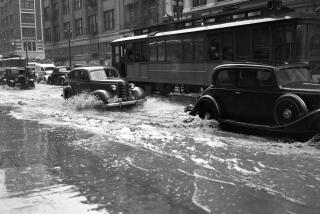Series on the Black Okies: Connecting Past to Present
- Share via
Re “The Black Okies,” (Aug. 25-27): These stories by Mark Arax about the pilgrimage of a great people from Oklahoma to a hard, rural setting in the middle of California are the finest examples of print journalism I’ve read since your paper’s series “Orphans of Addiction.” I was deeply moved by the language, the exhaustive reporting and the uncanny access to these incredible people.
John Steinbeck moved me in a similar fashion when he wrote of the people living along the Monterey coastline in his many fine novels, but his work was drawn from real people. Arax’s work was of real people. Thank you. It was a profound reading experience.
Steve Whitmore
Simi Valley
*
What a delight to see Matt Black’s stunning photographs illustrating your series. Each one is a work of art that not only visualizes a scene but evokes a double time and place--a then and now. The subtly nuanced pictures of today’s scenes in California almost subconsciously remind one of the Dust Bowl era of the ‘30s. Thank you, Matt Black. With each picture you have photographed the past and the present in the same frame.
Pamela de Maigret
Los Angeles
*
I would like to congratulate you on your courage in publishing the three-article series regarding the Black Okies. My question: What took you so long? These stories are not published often enough. Most of America is familiar with the migration of the Caucasian Okies, but many of us know a more complete story. This is my family’s story. Our relatives, on my maternal side, moved to California (Bakersfield, Wasco, Weed, etc.) prior to and during the period outlined in the articles. They also came to the “promised land” and were disappointed. However, the articles elicited many pleasant childhood memories.
Fortunately, our family did not live in those areas, but we know the stories. All during our childhood there was a wagon wheel in our parents’ front yard. It was placed there to remind us that that was the way our grandmother and her brothers came to California.
Michael F. Cochrane
Chatsworth
*
Although I cannot pretend to understand the hardships of being black, I see many similarities between Chuck Jones’ family and mine (Aug. 26). I am of Asian background, and even though my family did not come over here as slaves, they were used as slave labor during the construction of the transcontinental railroad. They, too, were abused and ridiculed because of their skin color. Because of the Chinese Exclusion Act (1882-1943) and the small immigration quota, my father was not eligible for citizenship until the mid-1950s, well after his arrival in the 1920s and the birth of his three daughters in the 1940s.
Like some in Jones’ family, we prospered in many fields. The problems his grandsons encountered were not because they were black, poor or lacked education or opportunities but because of their involvement with drugs. Hope is not a myth and America is not a land of tragedy. Rather, it is a land of choice, and if you make bad choices, you suffer the consequences. The positive is that, of his nine children, five did very well. Perhaps we should stop blaming society and make people feel more responsibility for their own plight.
Kathryn Roush
Granada Hills
*
I have just cried over “Life and Death of a Guardian Angel” (Aug. 27). What a wonderful article on family, love, hard work and belief in God. With all the horrible things happening in the world, this story showed that simple things are the most important things that people should hold in their hearts--a simple respect for all mankind and love for our families. Thank you, Mr. Arax, for trying to share this with others, but I’m afraid they are too wrapped up in their 401(k)s and new BMWs to give a thought to your wonderful article.
Sherry Valderrama
Thousand Oaks
More to Read
Sign up for our Book Club newsletter
Get the latest news, events and more from the Los Angeles Times Book Club, and help us get L.A. reading and talking.
You may occasionally receive promotional content from the Los Angeles Times.










